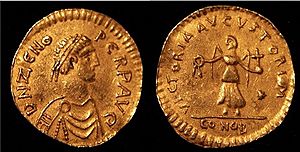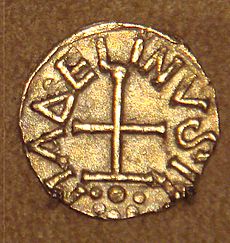Tremissis facts for kids


The tremissis (pronounced TREM-iss-iss) or tremis was a small coin made of solid gold. It was used a long time ago, during a period called Late Antiquity. Its name means "a third of a unit." This is because it was worth one-third of a larger gold coin called a solidus.
The tremissis was first used in Roman currency around the year 380 AD. It was introduced by the Roman Emperor Theodosius I. When it was first made, each tremissis weighed about 1.52 grams. This was equal to 8 siliquae, which was a small unit of weight.
Contents
History of the Tremissis
Roman tremisses were made often until the time of Emperor Leo III (who ruled from 717 to 741 AD). After that, they were not made as much in the eastern part of the empire. They were probably only used for special events or ceremonies.
The tremissis almost disappeared until the rule of Basil I (867–886 AD). After Basil I, they were no longer made. However, the coin continued to be used in the area of Sicily until the city of Syracuse fell in 878 AD.
Much later, in the 11th century, a coin called the trachy was introduced. It had the same value as the old tremissis. Even though it was not made of gold, it was worth one-third of the main gold coin of that time, which was called the hyperpyron. But it was not called a tremissis.
Tremissis Outside the Roman Empire
The tremissis was not just used by the Romans. Many other groups and kingdoms also made their own tremisses. These included the Anglo-Saxons, Burgundians, Franks, Frisians, Lombards, Ostrogoths, Suevi, and Visigoths. They made these coins between the 5th and 8th centuries.
In Old English, the language spoken by the Anglo-Saxons, the word "tremissis" became "thrymsa."
Different Names for the Tremissis
In some old Frankish writings, the tremissis was sometimes called a "triens." This word also means "a third." Originally, a triens was a bronze coin worth one-third of an as, which was another Roman coin.
A famous historian and bishop named Gregory of Tours called the Frankish tremissis a trians or treans. In Old High German, the coin was sometimes called dremise.
In French history books, the term tiers (meaning "third") or tiers de sou (meaning "third of a solidus") is often used for this coin. French historians usually prefer to call the coins made by the Merovingian kings "triens." However, British historians often prefer to use the name "tremissis."
The tremissis was still used as a way to count money in Sardinia until at least the 12th century. It appears as tremisse in old Sardinian documents called condaghe.
See also
 In Spanish: Tremís para niños
In Spanish: Tremís para niños
 | Aaron Henry |
 | T. R. M. Howard |
 | Jesse Jackson |

